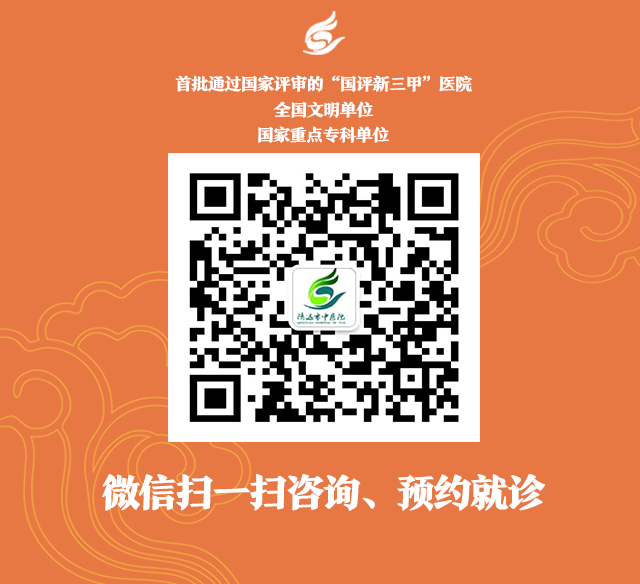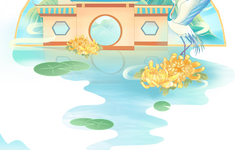 Click on “Qingyuan City Traditional Chinese Medicine Hospital” above to follow us!
Click on “Qingyuan City Traditional Chinese Medicine Hospital” above to follow us!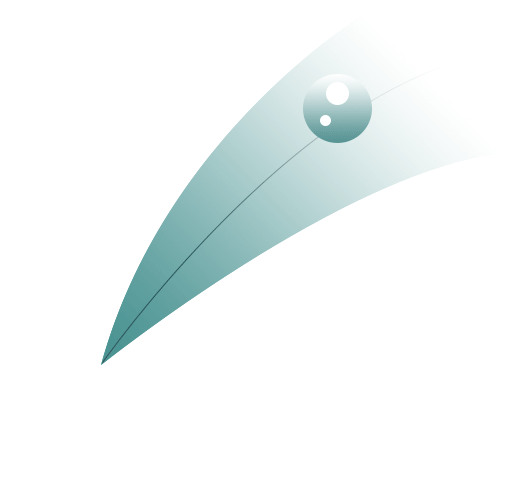 Cold Dew is the seventeenth solar term of the twenty-four solar terms and the fifth solar term of autumn. It occurs when the sun reaches the celestial longitude of 195 degrees. It marks the onset of late autumn and is characterized by the largest temperature drop of the autumn solar terms. As the saying goes, “A rain in autumn brings a chill.” During the Cold Dew season, autumn rains bring dampness and cold; the temperature difference between day and night is significant, and autumn dryness is evident. During this period, Yang energy gradually recedes, and Yin energy begins to rise, leading the body into a phase of storage. As the dryness becomes severe, all things avoid the cold. Therefore, during this special solar term, to enhance the body’s ability to resist diseases and adapt to the seasonal changes, we should adhere to five principles of health maintenance during Cold Dew: benefit the kidneys and replenish essence, warm Yang and nourish the heart, clear the liver and drain fire, disperse cold and promote lung function, and soothe the liver and nourish the stomach.
Cold Dew is the seventeenth solar term of the twenty-four solar terms and the fifth solar term of autumn. It occurs when the sun reaches the celestial longitude of 195 degrees. It marks the onset of late autumn and is characterized by the largest temperature drop of the autumn solar terms. As the saying goes, “A rain in autumn brings a chill.” During the Cold Dew season, autumn rains bring dampness and cold; the temperature difference between day and night is significant, and autumn dryness is evident. During this period, Yang energy gradually recedes, and Yin energy begins to rise, leading the body into a phase of storage. As the dryness becomes severe, all things avoid the cold. Therefore, during this special solar term, to enhance the body’s ability to resist diseases and adapt to the seasonal changes, we should adhere to five principles of health maintenance during Cold Dew: benefit the kidneys and replenish essence, warm Yang and nourish the heart, clear the liver and drain fire, disperse cold and promote lung function, and soothe the liver and nourish the stomach. Five Principles of Health Maintenance During Cold Dew
Five Principles of Health Maintenance During Cold Dew Benefit the Kidneys and Replenish EssenceThe kidneys are the “foundation of life and source of vitality” in the human body. Traditional Chinese Medicine (TCM) believes that autumn is the best time to nourish the kidneys, laying a foundation for winter and enhancing the body’s ability to resist the cold.Three identification methods—check the heels, observe the eyes, and examine the hair to determine if your kidneys are healthy.Heel PainThe Kidney Meridian (Shǎo Yīn) runs through the feet, and kidney deficiency can lead to insufficient nourishment of the heels, resulting in heel pain.Dark CirclesKidney deficiency can lead to poor skin nourishment, resulting in a dark complexion and dark circles under the eyes.White Hair
Benefit the Kidneys and Replenish EssenceThe kidneys are the “foundation of life and source of vitality” in the human body. Traditional Chinese Medicine (TCM) believes that autumn is the best time to nourish the kidneys, laying a foundation for winter and enhancing the body’s ability to resist the cold.Three identification methods—check the heels, observe the eyes, and examine the hair to determine if your kidneys are healthy.Heel PainThe Kidney Meridian (Shǎo Yīn) runs through the feet, and kidney deficiency can lead to insufficient nourishment of the heels, resulting in heel pain.Dark CirclesKidney deficiency can lead to poor skin nourishment, resulting in a dark complexion and dark circles under the eyes.White Hair
Common issues like hair loss and greying are often caused by kidney deficiency. Hair nourishment comes from blood; if hair turns white or falls out, it is mostly due to insufficient liver blood and weak kidney Qi. Treatment methods include nourishing liver blood and kidney Qi. Under the guidance of a physician, herbs such as He Shou Wu (Fo-Ti), Dang Gui (Angelica), Bu Gu Zhi (Psoralea), Goji Berries, Sha Yuan Zi (Astragalus), Fu Ling (Poria), and Niu Xi (Achyranthes) can be used for dietary therapy to nourish the liver and kidneys.
To maintain kidney health daily, reduce consumption, and supplement with appropriate foods. First, consume foods that nourish Yin fluids, such as radishes, white fungus, lilies, goji berries, sesame, honey, pears, and water chestnuts; since the spleen and stomach are the foundation of postnatal health, to nourish the kidneys, it is essential to combine foods that strengthen the spleen and stomach, such as chestnuts, lotus root, yam, red dates, japonica rice, lotus seeds, persimmons, and bananas, while reducing the intake of spicy foods like chili, scallions, and ginger.
Second, keep the lower back and feet warm: the lower back is the residence of the kidneys. Elderly individuals with declining Yang energy may experience exacerbated symptoms of lower back strain due to cold stimulation. It is advisable for the elderly to wear a vest when going out in the morning and evening. Additionally, abdominal and back exercises from radio calisthenics can effectively warm the lower back. Rubbing warm hands on the lower back can also invigorate Yang energy. The feet, known as the second heart of the body, are susceptible to cold, which can lead to illness. After Cold Dew, it is important to keep the feet warm; avoid wearing open-toed shoes and exposing the ankles. You can also use the time spent watching TV at night to stand on tiptoes and lower back down repeatedly until you break a light sweat. After exercising, soak your feet in warm water; the feet have many reflex zones corresponding to different parts of the body, and massaging them while soaking can promote blood circulation and warm the entire body.
Note: The water temperature should not be too high; 38℃ to 42℃ is appropriate, and the soaking time should not exceed 20 minutes. Third, go to bed early and avoid staying up late. The principle of daily routine during Cold Dew is to rise early and sleep early, which helps to align with the expansion of Yang energy and benefits the storage of Yin essence. Fourth, avoid anxiety. Learn to manage emotions; when feeling tense, excited, or depressed, adjust promptly. Foods like millet, lotus seeds, and longan can calm the mind and soothe the spirit; taking walks outdoors after lunch can improve calcium absorption and metabolism, preventing osteoporosis.
Warm Yang and Nourish the HeartAfter Cold Dew, the weather begins to turn cold, increasing the risk of cardiovascular diseases such as angina and myocardial infarction. In ancient times, physicians attempted to treat coronary heart disease with herbs like Dan Shen (Salvia), San Qi (Notoginseng), and Bing Pian (Borneol) that invigorate blood circulation, open the orifices, and relieve pain. Following the principle of “sovereign, minister, assistant, and envoy,” each herb serves as a target, working together for a synergistic effect. From ancient times to the present, TCM has accumulated considerable experience in preventing and treating coronary heart disease, especially in protecting blood vessels, improving microcirculation, assisting in lipid reduction, and providing antioxidant and anti-anxiety effects. Commonly used formulas include Xue Fu Zhu Yu Tang (Blood Mansion Drive Out Stasis Decoction), Gua Lou Xie Bai Ban Xia Tang (Trichosanthes, Garlic, and Pinellia Decoction), Fu Mai Tang (Restore Pulse Decoction), and Dang Gui Si Ni Tang (Angelica Four Reversal Decoction), as well as proprietary Chinese medicines.Clear the Liver and Drain FireIn cold weather, the blood vessels around the body tend to constrict for extended periods, which can lead to elevated blood pressure and trigger various cardiovascular events. TCM has different approaches for different populations.Hypertension in the ElderlyCharacterized primarily by elevated systolic pressure, with features of arteriosclerosis and renal function decline. TCM diagnosis often reveals kidney deficiency and blood stasis, with treatment focusing on benefiting the kidneys and invigorating blood circulation.Hypertension in Young AdultsIn TCM, this is primarily diagnosed as liver Yang hyperactivity and excessive liver fire, with treatment aimed at clearing the liver and draining fire. Chinese patent medicines containing ingredients like Ling Yang Jiao (Antelope Horn), Zhen Zhu (Pearl), Shui Niu Jiao (Water Buffalo Horn), and artificial Niuhuang (Cattle Bile) can effectively alleviate symptoms such as dizziness, headaches, insomnia, and irritability caused by excessive liver fire and phlegm-heat.Hypertension During MenopauseOften characterized by endocrine disorders, TCM focuses on regulating Yin and Yang, using both Yang tonics and Yin nourishing herbs, with treatment primarily based on modifications of Er Xian Tang (Two Immortals Decoction).Disperse Cold and Promote Lung Function
As the weather turns cold, many people may experience cough, phlegm, and throat irritation. TCM believes that cough occurs due to various factors invading the lungs, disrupting the lung’s Qi mechanism, leading to abnormal lung function and upward Qi rebellion.
Wind-cold phlegm obstructing the lungs manifests as thin white phlegm, with a white or greasy tongue coating. Under the guidance of a physician, herbs like Ma Huang (Ephedra), Xing Ren (Apricot Kernel), Gan Cao (Licorice), Zi Su (Perilla), Ban Xia (Pinellia), Chen Pi (Dried Tangerine Peel), Fu Ling (Poria), and Sheng Jiang (Fresh Ginger) can be used to create appropriate dietary therapy to disperse lung Qi and resolve phlegm.
Wind-heat cough manifests as yellow phlegm, thick and difficult to cough up, with dry mouth, sore throat, headache, and fever. Under the guidance of a physician, herbs like Jin Yin Hua (Honeysuckle), Lian Qiao (Forsythia), Bo He (Mint), Sang Ye (Mulberry Leaf), and Ju Hua (Chrysanthemum) can be used to brew tea to disperse wind-heat and stop cough.
Soothe the Liver and Nourish the StomachAs the ancient saying goes, “Spring hurts, autumn grieves.” According to TCM theory, autumn corresponds to the emotion of grief. After Cold Dew, as the weather cools and the wind rises, it is easy for people to feel a sense of desolation, leading to sadness, depression, and emotional distress. Prolonged negative emotions can lead to physical symptoms, with a typical TCM diagnosis being “liver-stomach disharmony,” primarily manifesting as rib pain, irritability, dry mouth, dizziness, blurred vision, poor appetite, belching, abdominal bloating, and constipation or diarrhea.Soothe the liver can be treated with herbal decoctions or Chinese patent medicines, under the guidance of a physician, using modified Xiao Yao Wan (Free and Easy Wanderer Pill) or Shu Gan He Wei Wan (Soothe Liver and Harmonize Stomach Pill). In addition to medication, exercises like Wu Qin Xi (Five Animal Frolics) and Ba Duan Jin (Eight Pieces of Brocade) can help relieve emotional distress and promote gastrointestinal motility, alleviating indigestion. Climbing to a high place can also help clear the mind, as standing at a height broadens one’s perspective, dispelling gloomy feelings. Thus, climbing can prevent autumn sorrow and relieve liver stagnation.For nourishing the stomach, you can use Chen Pi (Dried Tangerine Peel), Ju Hong (Red Tangerine Peel), Fo Shou (Buddha’s Hand), and Dai Dai Hua (Bitter Orange Flower) in amounts of 3-5 grams, steeped in hot water for frequent consumption. Dietary Health Maintenance During Cold Dew
Dietary Health Maintenance During Cold Dew 1. Chrysanthemum Tea:Chrysanthemum enters the liver and lung meridians, dispersing wind-heat and clearing the liver to brighten the eyes. During the Cold Dew season, yellow chrysanthemum should be selected, as it enters the lung meridian and has a strong effect in relieving liver stagnation and clearing lung heat.2. Mixed Ginkgo:Ginkgo enters the lung and kidney meridians, stopping cough and relieving asthma, consolidating the lungs and transforming phlegm; black fungus nourishes Yin and invigorates blood; cucumber nourishes Yin and moistens dryness; carrot tonifies deficiency and strengthens the spleen; yam benefits the lungs, strengthens the spleen, and nourishes the kidneys. This combination of ingredients is not only refreshing and delicious but also moistens the lungs and consolidates lung Yin. Note: Ginkgo has slight toxicity and should be boiled for 10 minutes to remove toxins.3. Sea Cucumber and Duck Soup:Water duck over one year old is the best for nourishing Yin; sea cucumber can replenish the kidneys, benefit essence, and nourish blood while also warming the kidney Yang; ham adds flavor and awakens the spleen, enhancing its ability to transform and balance the richness of the sea cucumber and duck. This combination is not only delicious but also nourishes the kidneys, moistens the lungs, and clears empty heat.4. Yam, Lotus Seed, and Lily Porridge:Yam has the effects of strengthening the spleen and stomach, benefiting kidney Qi, nourishing lung fluids, and strengthening the body; lotus seeds can tonify the spleen and stop diarrhea, benefit the kidneys and astringe essence, and calm the heart and mind. When combined with yam, the therapeutic effect is enhanced; lily can stop cough, resolve phlegm, and nourish the lungs.5. Lotus Root and Black Fungus Soup:Black fungus is rich in iron and vitamins, which can nourish blood and Qi, and enhance the body’s immunity; lotus root grows in water, absorbing its essence, and has the effects of tonifying the center, nourishing the spirit, benefiting the spleen, and nourishing the stomach, clearing heat, generating fluids, and moistening the lungs, preventing dryness from invading the body. This soup can nourish the body, moisten dryness, and enhance resistance.6. Licorice, Wheat, and Jujube Tea:Licorice (9g), wheat (15g), and more than ten jujubes combined can nourish the heart and calm the spirit, harmonizing the middle and alleviating urgency. This is beneficial for those experiencing anxiety, irritability, mental confusion, frequent sadness, inability to control emotions, restlessness, and sleep disturbances due to excessive stress.
1. Chrysanthemum Tea:Chrysanthemum enters the liver and lung meridians, dispersing wind-heat and clearing the liver to brighten the eyes. During the Cold Dew season, yellow chrysanthemum should be selected, as it enters the lung meridian and has a strong effect in relieving liver stagnation and clearing lung heat.2. Mixed Ginkgo:Ginkgo enters the lung and kidney meridians, stopping cough and relieving asthma, consolidating the lungs and transforming phlegm; black fungus nourishes Yin and invigorates blood; cucumber nourishes Yin and moistens dryness; carrot tonifies deficiency and strengthens the spleen; yam benefits the lungs, strengthens the spleen, and nourishes the kidneys. This combination of ingredients is not only refreshing and delicious but also moistens the lungs and consolidates lung Yin. Note: Ginkgo has slight toxicity and should be boiled for 10 minutes to remove toxins.3. Sea Cucumber and Duck Soup:Water duck over one year old is the best for nourishing Yin; sea cucumber can replenish the kidneys, benefit essence, and nourish blood while also warming the kidney Yang; ham adds flavor and awakens the spleen, enhancing its ability to transform and balance the richness of the sea cucumber and duck. This combination is not only delicious but also nourishes the kidneys, moistens the lungs, and clears empty heat.4. Yam, Lotus Seed, and Lily Porridge:Yam has the effects of strengthening the spleen and stomach, benefiting kidney Qi, nourishing lung fluids, and strengthening the body; lotus seeds can tonify the spleen and stop diarrhea, benefit the kidneys and astringe essence, and calm the heart and mind. When combined with yam, the therapeutic effect is enhanced; lily can stop cough, resolve phlegm, and nourish the lungs.5. Lotus Root and Black Fungus Soup:Black fungus is rich in iron and vitamins, which can nourish blood and Qi, and enhance the body’s immunity; lotus root grows in water, absorbing its essence, and has the effects of tonifying the center, nourishing the spirit, benefiting the spleen, and nourishing the stomach, clearing heat, generating fluids, and moistening the lungs, preventing dryness from invading the body. This soup can nourish the body, moisten dryness, and enhance resistance.6. Licorice, Wheat, and Jujube Tea:Licorice (9g), wheat (15g), and more than ten jujubes combined can nourish the heart and calm the spirit, harmonizing the middle and alleviating urgency. This is beneficial for those experiencing anxiety, irritability, mental confusion, frequent sadness, inability to control emotions, restlessness, and sleep disturbances due to excessive stress.
 Acupoint Health Maintenance During Cold Dew
Acupoint Health Maintenance During Cold Dew
 Middle Cavity Point (Zhong Wan)
Middle Cavity Point (Zhong Wan) Location: 4 inches above the navel on the midline of the abdomen.
Location: 4 inches above the navel on the midline of the abdomen.
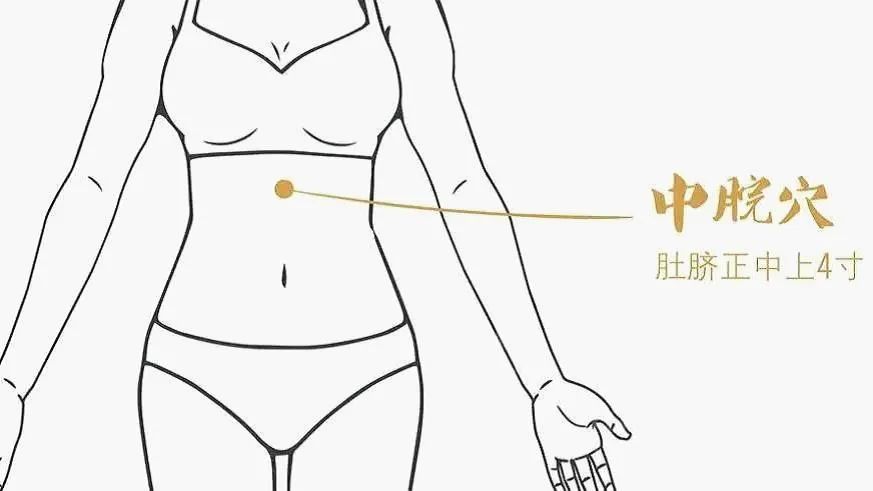
Function: This point is the Mu point of the Yangming stomach and the meeting point of the six fu organs. Mu points are where the Qi of the organs converges, commonly used for treating diseases of the six fu organs. It can harmonize stomach Qi, regulate the middle burner, and transform damp stagnation, thus this point can treat digestive system diseases. Tonifying it can benefit the spleen and stomach, replenishing the deficiency of the organs, and is commonly used to regulate the spleen and stomach.Moxibustion: Generally performed with mild moxibustion, light the end of the moxa stick and hold it about 2-3 cm from the acupoint, allowing the patient to feel warmth; typically, moxibustion is applied for 10-15 minutes on each side until the skin shows slight redness. Lung Shu Point (Fei Shu)
Lung Shu Point (Fei Shu) Location: The back Shu point of the lung, located 1.5 inches lateral to the spinous process of the third thoracic vertebra on the foot Taiyang bladder meridian.
Location: The back Shu point of the lung, located 1.5 inches lateral to the spinous process of the third thoracic vertebra on the foot Taiyang bladder meridian.
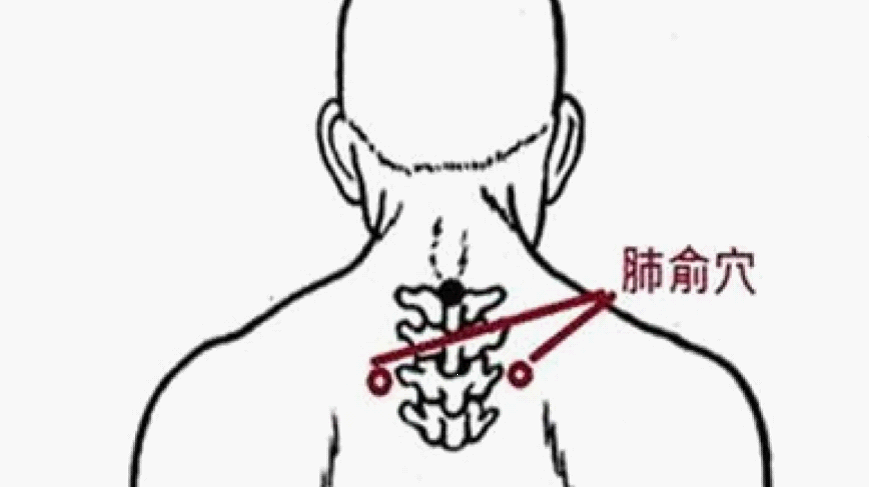
Function: The lungs govern the dispersal and downward movement of Qi, and this point can disperse and descend lung Qi, treating exterior pathogenic invasion leading to exterior symptoms, or skin rashes and itching caused by wind pathogens. This point is also where the lung’s essence Qi is transported, and can tonify lung Qi, making it a key point for treating lung Qi deficiency-related diseases.Moxibustion: Generally performed with mild moxibustion, light the end of the moxa stick and hold it about 2-3 cm from the acupoint, allowing the patient to feel warmth; typically, moxibustion is applied for 10-15 minutes on each side until the skin shows slight redness. Zu San Li (Stomach 36)
Zu San Li (Stomach 36) In TCM, the stomach meridian is referred to as the “longevity meridian.” About 20 minutes after meals, rub the knee joint repeatedly, press or tap the outer side of the lower leg at the Zu San Li point for 3-5 minutes, which has a bidirectional regulating effect, both generating stomach Qi and drying dampness in the spleen, helping to strengthen the body and prolong life; it also enhances gastrointestinal function, promotes fat metabolism, and assists in weight loss.
In TCM, the stomach meridian is referred to as the “longevity meridian.” About 20 minutes after meals, rub the knee joint repeatedly, press or tap the outer side of the lower leg at the Zu San Li point for 3-5 minutes, which has a bidirectional regulating effect, both generating stomach Qi and drying dampness in the spleen, helping to strengthen the body and prolong life; it also enhances gastrointestinal function, promotes fat metabolism, and assists in weight loss. Lao Gong Point (Pericardium 8)
Lao Gong Point (Pericardium 8) We have a warming switch in our hands—Lao Gong point, which can be massaged in autumn and winter for warmth.The Lao Gong point is located in the center of the palm, between the second and third metacarpal bones, where the tip of the middle finger touches when making a fist.
We have a warming switch in our hands—Lao Gong point, which can be massaged in autumn and winter for warmth.The Lao Gong point is located in the center of the palm, between the second and third metacarpal bones, where the tip of the middle finger touches when making a fist.
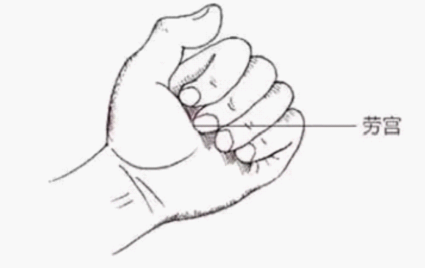
The Lao Gong point belongs to the fire element and can be massaged in a counterclockwise direction using pressing and rubbing techniques for about 10 minutes per session, 2-3 times a day, which can warm the hands, calm the mind, and promote sleep.Health maintenance through massage is not achieved overnight; it requires persistence, gradual accumulation, and consistent effort to see results.
Expert Introduction

Liu QiangChief Physician of Internal Medicine, Professor. Member of the Board of the International Federation of Traditional Chinese Medicine and the Executive Committee of the Preventive Medicine Professional Committee of the Guangdong Province Association of Integrative Medicine. Vice Chairman of the Pulmonary Disease Professional Committee of the Qingyuan City TCM Association. With rich clinical experience, he advocates the academic thought of “supporting Yang and protecting the righteous” and has remarkable therapeutic effects in TCM for chronic internal diseases, sub-healthy populations, individuals with weak constitutions, cancer rehabilitation, and preconception care.

Xiàng DōngméiAttending Physician, Master’s Degree, graduated from the Acupuncture and Tuina Department of Hunan University of Traditional Chinese Medicine. Studied under Professor Xu Zong at the Acupuncture Department of the Affiliated Hospital of Jinan University, specializing in rehabilitation treatment for brain injuries (stroke, traumatic brain injury, etc.) and spinal cord injuries at the Third Affiliated Hospital of Sun Yat-sen University, as well as pain treatment through musculoskeletal ultrasound and muscle and joint injections. With over ten years of clinical experience in TCM rehabilitation medicine, he possesses a solid foundation in TCM theory and rich clinical experience, advocating the academic thought of “warming Yang and supporting the righteous,” and is skilled in treating various chronic diseases, with extensive clinical experience in pain, stroke, rhinitis, asthma, herpes zoster, and other conditions, as well as good therapeutic effects in TCM for sub-healthy populations, cancer rehabilitation, preconception care, and health maintenance for the elderly.
 END
END
Text/Images: Xiàng Dōngméi
※Some materials are sourced from the internet; if there is any infringement, please contact for removal.
